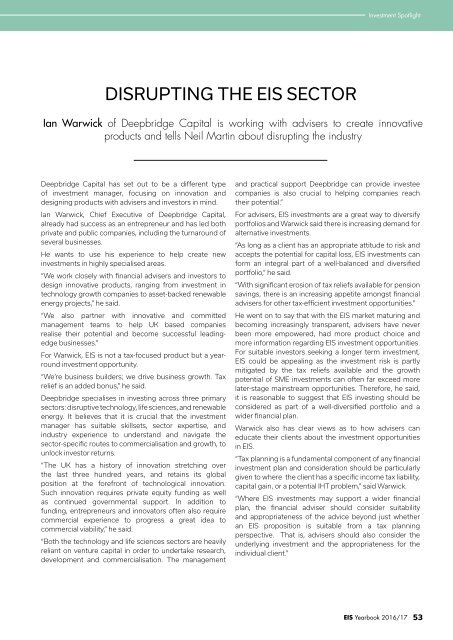2fnoNyY
2fnoNyY
2fnoNyY
You also want an ePaper? Increase the reach of your titles
YUMPU automatically turns print PDFs into web optimized ePapers that Google loves.
Investment Spotlight<br />
DISRUPTING THE EIS SECTOR<br />
Ian Warwick of Deepbridge Capital is working with advisers to create innovative<br />
products and tells Neil Martin about disrupting the industry<br />
Deepbridge Capital has set out to be a different type<br />
of investment manager, focusing on innovation and<br />
designing products with advisers and investors in mind.<br />
Ian Warwick, Chief Executive of Deepbridge Capital,<br />
already had success as an entrepreneur and has led both<br />
private and public companies, including the turnaround of<br />
several businesses.<br />
He wants to use his experience to help create new<br />
investments in highly specialised areas.<br />
“We work closely with financial advisers and investors to<br />
design innovative products, ranging from investment in<br />
technology growth companies to asset-backed renewable<br />
energy projects,” he said.<br />
“We also partner with innovative and committed<br />
management teams to help UK based companies<br />
realise their potential and become successful leadingedge<br />
businesses.”<br />
For Warwick, EIS is not a tax-focused product but a yearround<br />
investment opportunity.<br />
“We’re business builders; we drive business growth. Tax<br />
relief is an added bonus,” he said.<br />
Deepbridge specialises in investing across three primary<br />
sectors: disruptive technology, life sciences, and renewable<br />
energy. It believes that it is crucial that the investment<br />
manager has suitable skillsets, sector expertise, and<br />
industry experience to understand and navigate the<br />
sector-specific routes to commercialisation and growth, to<br />
unlock investor returns.<br />
“The UK has a history of innovation stretching over<br />
the last three hundred years, and retains its global<br />
position at the forefront of technological innovation.<br />
Such innovation requires private equity funding as well<br />
as continued governmental support. In addition to<br />
funding, entrepreneurs and innovators often also require<br />
commercial experience to progress a great idea to<br />
commercial viability,” he said.<br />
“Both the technology and life sciences sectors are heavily<br />
reliant on venture capital in order to undertake research,<br />
development and commercialisation. The management<br />
and practical support Deepbridge can provide investee<br />
companies is also crucial to helping companies reach<br />
their potential.”<br />
For advisers, EIS investments are a great way to diversify<br />
portfolios and Warwick said there is increasing demand for<br />
alternative investments.<br />
“As long as a client has an appropriate attitude to risk and<br />
accepts the potential for capital loss, EIS investments can<br />
form an integral part of a well-balanced and diversified<br />
portfolio,” he said.<br />
“With significant erosion of tax reliefs available for pension<br />
savings, there is an increasing appetite amongst financial<br />
advisers for other tax-efficient investment opportunities.”<br />
He went on to say that with the EIS market maturing and<br />
becoming increasingly transparent, advisers have never<br />
been more empowered, had more product choice and<br />
more information regarding EIS investment opportunities.<br />
For suitable investors seeking a longer term investment,<br />
EIS could be appealing as the investment risk is partly<br />
mitigated by the tax reliefs available and the growth<br />
potential of SME investments can often far exceed more<br />
later-stage mainstream opportunities. Therefore, he said,<br />
it is reasonable to suggest that EIS investing should be<br />
considered as part of a well-diversified portfolio and a<br />
wider financial plan.<br />
Warwick also has clear views as to how advisers can<br />
educate their clients about the investment opportunities<br />
in EIS.<br />
“Tax planning is a fundamental component of any financial<br />
investment plan and consideration should be particularly<br />
given to where the client has a specific income tax liability,<br />
capital gain, or a potential IHT problem,” said Warwick.<br />
“Where EIS investments may support a wider financial<br />
plan, the financial adviser should consider suitability<br />
and appropriateness of the advice beyond just whether<br />
an EIS proposition is suitable from a tax planning<br />
perspective. That is, advisers should also consider the<br />
underlying investment and the appropriateness for the<br />
individual client.”<br />
EIS Yearbook 2016/17<br />
53


